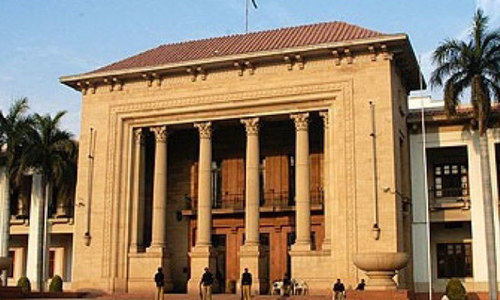
ISLAMABAD: Years after efforts to update Christian personal laws began, the draft Christian Marriage and Divorce Bill 2019 has become the subject of an ideological divide between progressive elements and the Catholic clergy in Pakistan as well as a rift between the ministries of human rights and law and justice.
Read: 'Absence of marriage laws for minorities denies them many rights'
The bill, which aims to update prevailing 140-year-old Christian personal laws, was approved by the federal cabinet in August. At the time, Minister of Human Rights Dr Shireen Mazari had expressed confidence that the bill would soon be presented in the National Assembly, her ministry being the mover.
But the bill, which would update the Christian Divorce Act 1869 and the Christian Marriage Act 1870, is now in limbo and both the ministries of human rights and law have claimed the bill is with the other ministry.
The bill was first forwarded to the law ministry by the Ministry of Human Rights to be vetted.
Maleeka Bokhari, the parliamentary secretary for law, held several rounds of meetings with three primary parties: the Community World Service – National Lobbying Delegation (CWS/NLD), a second group lead by Peter Jacob from the Centre for Social Justice and a Catholic group led by Father James Channan.
Approved by cabinet in Aug, the draft bill has become mired in an ideological divide and a bureaucratic rift
While the first two groups are proponents of the law, the third is a staunch opponent and one of the key reasons for the delay in it being tabled.
After the consultations were completed, the bill was returned to the human rights ministry in September.
A law ministry official said there were “serious concerns” about the draft, and “it is expected that the Ministry of Human Rights will accommodate the concerns of all the stakeholders.”
The Ministry of Human Rights returned the bill to the law ministry in the second week of October after meetings with the three groups in question. But the Ministry of Law has maintained that all its concerns have not been incorporated.
The key issue for both ministries arises from objections put forward by the Catholic clergy. Father James Channan, who is part of the one of the groups sharing its concerns with the government, has claimed that the clergy of Pakistan does not recognise a number of provisions in the draft, including the right to divorce.
“We represent the largest group among Christians in Pakistan and there are around 1.2 billion Catholics in the world led by the Pope,” he said. “This law, like the Christian Divorce Act 1869, is against the teachings of the Bible and the Christian laws the Code of Canon.”
The second group involved, led by Mr Jacob, also includes Bishop Alexander John. They believe in progressive laws, and have lauded the law and human rights ministries for incorporating their recommendations into the bill.
“There should not be any role of either the Council of Islamic Ideology or the orthodox churches in laws related to individuals in the modern era,” Mr Jacob said.
CWS/NLD, the third party, has pursued bringing Christian marriage and divorce laws up to date for more than four years. They believe that it is the responsibility of the state and not the clergy to formulate legislation that benefits citizens.
“These are delaying tactics by a few individuals now that the bill is in its final stages,” CWS’ Asif Adeel told Dawn.
He added that were several rounds of consultations held by Kamran Michael, the minister for human rights during the last PML-N government, and later by former minister of human rights Mumtaz Ahmed Tarar.
“Such people should have come up at that time,” he said.
He recalled that Mr Tarar had announced in October 2017 that the Christian Marriage and Divorce Bill would be forwarded to the cabinet for final approval.
“Such people delayed it by two years and now some group wants to delay the bill further,’ Mr Aqeel said. “Many issues can be resolved and added when the bill is taken up by the standing committees.”
But when will the bill reach the standing committees?
In a meeting of the National Assembly Standing Committee on Human Rights on Oct 7, Minister for Human Rights Dr Shireen Mazari complained to Bilawal Bhutto Zardari, the committee chair, that the Law Division is deliberately delaying public concern legislation.
A senior law ministry official maintained that they had to follow their set rules.
“This is not unique to this draft. It is a routine matter that if stakeholders want to give their input it is given due consideration by the law ministry. In this case, there were serious concerns raised by some members of the Christian community, mainly the clergy,” the official told Dawn.
The official said these concerns have been forwarded to the Ministry of Human Rights to be incorporated into the bill. The human rights ministry has made some amendments to the bill, based on the law ministry’s recommendations.
The Ministry of Human Rights is not willing to accommodate the outright opposition to any law that permits divorce, a human rights ministry official said.
“We want a progressive law as per the needs of the Christian community in modern times,” the official said, who also said the draft was returned to the law ministry in early October.
The senior law ministry official told Dawn they have not received the draft.
To end the discussion between both ministries in the meeting on Oct 7, Mr Bhutto Zardari had said the matter was between two government departments, and they should resolve it before bringing anything to the committee.
But with both ministries still pointing the finger at each other nearly a month later, the matter – and the bill’s future – remains unresolved.
Published in Dawn, November 5th, 2019













































